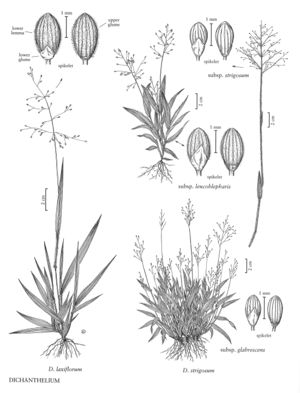familyPoaceae
subfamilyPoaceae subfam. Panicoideae
genusDichanthelium
sectionDichanthelium sect. Strigosa
speciesDichanthelium strigosum
subspeciesDichanthelium strigosum subsp. strigosum
Difference between revisions of "Dichanthelium strigosum subsp. strigosum"
Treatment appears in FNA Volume 25. Treatment on page 447.
FNA>Volume Importer |
imported>Volume Importer |
||
| (3 intermediate revisions by 2 users not shown) | |||
| Line 36: | Line 36: | ||
|publication year= | |publication year= | ||
|special status= | |special status= | ||
| − | |source xml=https:// | + | |source xml=https://bitbucket.org/aafc-mbb/fna-data-curation/src/200273ad09963decb8fc72550212de541d86569d/coarse_grained_fna_xml/V25/V25_1215.xml |
|subfamily=Poaceae subfam. Panicoideae | |subfamily=Poaceae subfam. Panicoideae | ||
|tribe=Poaceae tribe Paniceae | |tribe=Poaceae tribe Paniceae | ||
Latest revision as of 18:56, 11 May 2021
Culms often 30-45 cm, pilose to subglabrous; nodes bearded. Cauline blades pilose on both surfaces, those of the upper leaves very reduced. Spikelets 1.1-1.6 mm, glabrous, obovoid; lower glumes about 1/3 as long as the spikelets. 2n = 18.
Discussion
Dichanthelium strigosum subsp. strigosum grows in sandy, low, open pine woods and bogs. It is the most widespread of the three subspecies, extending from southeastern Virginia through the coastal plain to eastern Texas, Florida, Cuba, and the West Indies to Colombia.
Selected References
None.
Lower Taxa
None.
... more about "Dichanthelium strigosum subsp. strigosum"
